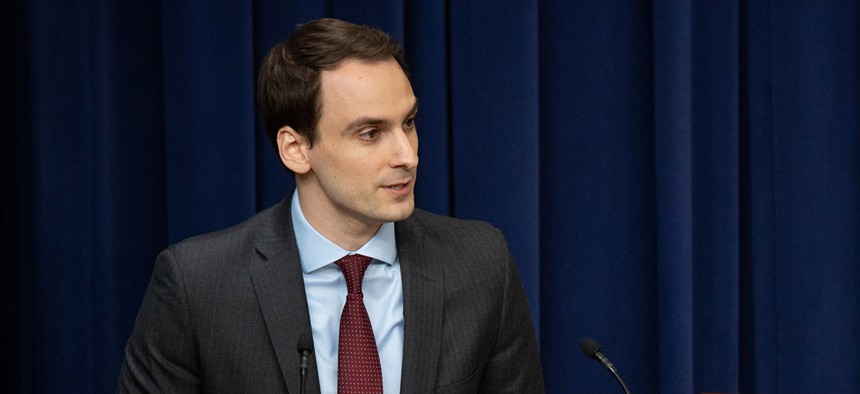White House Official: Bet on U.S. to Win the AI War

U.S. Deputy Chief Technology Officer Michael Kratsios NASA
The federal deputy chief technology officer is confident the U.S. will win the artificial intelligence race, but China is catching up fast.
A top White House technology leader is convinced the U.S. will win the race for global dominance in artificial intelligence despite competitors like China pouring more resources into fleshing out the technology.
“I’m always going to bet on the American innovation ecosystem,” said U.S. Deputy Chief Technology Officer Michael Kratsios. “It’s one part federal funding, it’s one part private sector and it’s one part academia ... all working hand-in-hand in a market-driven economy. That is what we’re doubling down on in ensuring our next great [inventions] are developed here in the U.S.”
It’s this collaborative model that gives the U.S. an edge over more authoritarian regimes that favor a “top-down, industrial approach” to research and development, he said Tuesday during a discussion at the U.S. Chamber of Commerce.
Kratsios added the White House Office of Science and Technology Policy, where he serves as the top-ranking official, strongly encourages federal agencies to focus research and development efforts on artificial intelligence, and foreign allies are also renewing investments their own research.
Federal spending on unclassified AI research increased 40 percent since 2015, according to the White House, and Kratsios said today the government devotes roughly $1.5 billion to those efforts each year. While that money covers a variety of endeavors, he said agencies make the biggest impact by funding basic research where the private sector may have little incentive to invest.
“If you really look at the commitment that this federal government has made to AI, it’s really unparalleled,” said Kratsios.
But across the Pacific, China seems to be matching that commitment, if not exceeding it.
Experts widely consider China to be the biggest threat to U.S. dominance in artificial intelligence, and last year its government released a plan for growing the technology into a $150 billion domestic industry by 2030. Though it’s unclear exactly how much funding the country is pouring into R&D, the Chinese city of Tianjin announced it would establish a $16 billion fund to support the artificial intelligence industry and the Beijing government is working to build a $2 billion AI research park in the city.
Kratsios pointed out government funding is only one part of the R&D environment, but other experts noted China’s innovation ecosystem might not differ from America’s as much as he thinks.
“The American model of innovation is unique, but at the same time we are starting to see a number of these elements also emerging in China’s approach to development,” said Elsa Kania, an adjunct fellow at the Center for New American Security who specializes in Chinese technological advancement.
Chinese businesses have increasingly begun to partner with academia on artificial intelligence research efforts, Kania said, and those initiatives have spawned a number of joint laboratories aimed at bridging the gap between academic research and the commercial market. She added the country’s heavy investment has also helped Chinese groups attract top AI experts from around the world, including some technologists defecting from Silicon Valley.
While Kania noted people “should be skeptical of the hype” surrounding China’s push in artificial intelligence, policymakers can’t get complacent either, especially considering CB Insights found Chinese AI startups as a whole received more funding than their U.S. counterparts last year.
“We shouldn’t take for granted that the U.S. will necessarily lead in AI. I think whether or not we do will depend on policy and strategic choices we make today and tomorrow,” she said.



